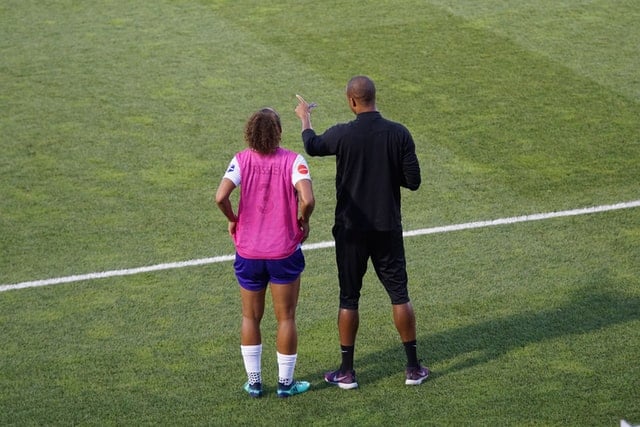The rules regarding substitution in soccer can sometimes be overwhelming, but when it comes to the timings of the substitutions, the rules are actually simple.
This article will list the scenarios under which a substitution can be made during a soccer match, and I’ll also be talking about the process of substitution in details.
When can a substitution be made in soccer?
A substitution can be made in soccer only during a stoppage in play. Substitutions are not allowed while the ball is in play. Also, substitutions can only take place when the referee is informed about them and when the referee gives the signal to allow the substitution to happen.
So in simple words, substitutions can take place during any time throughout the whole game as long as the ball is not in play (the game is stopped), and as long as the referee is informed about them.
These rules apply to most of the top soccer leagues around the world including the Premier League, La Liga, and so on, and they aren’t just specific to certain soccer leagues.
Also, note that substitutions can only occur if the team has not used all of their allowed substitutions. In most cases, only 3 substitutions are allowed for each soccer team (some leagues are temporarily allowing 5 substitutions due to the effect of the pandemic).
Here are the scenarios under which a substitution can take place in soccer:
1- The ball goes out of play
If the game stops because of a foul, or because the ball went outside the field of play, or because of any other reason, then the main referee of the match may decide to allow a substitution to happen if any of the coaches of the competing team have told the assistant referees that they want to make a substitution.
2- The end of the first halves
A team can also make a substitution during the halftimes of the game. In general, there is only one halftime in a soccer game. However, there can also be another half time if the game goes into an extra time.
During these 2 halftimes, a soccer coach can decide to make a substitution and the substitute joins their team during the restart of the rest of the match.
3- The end of the second halves
If a soccer match goes for an extra time, then any of the teams can make a substitution before the extra time starts.
In addition to that, coaches can also make substitutions before the penalty kicks if the extra time of the game also ends in a draw.
If you want to learn more about the extra time and the duration of a soccer match in general, you can check this detailed article about the subject.
How does the substitution process work?
You now know when a substitution is allowed to take place in soccer, but how exactly does the substitution process work?
Well, this one is also simple. Here are the steps required for a substitution to be made during a soccer game:
1- The coach informs the referee that they want to make a substitution
After some of the substitute players warm up outside of the field of play, the coach tells an assistant referee that they want to make a substitution. The coach should inform the referee about who the substitute player is, and who the player to be substituted is.

2- The assistant referee informs the main referee that a substitution is requested.
The main referee of the match needs to be informed that a substitution request has been made by one of the teams (or both teams).
After the main referee knows about the substitution, they signal the assistant referee to let the substitution take place whenever they get the chance to.
For example, the main referee usually immediately allows the substitution to take place the moment the ball goes out of play. Remember that they can’t allow substitutions to happen while the game is on, so they’ll have to wait till the ball goes out of play.
3- The substituted player receives the permission of the referee to leave the field
After the referee decides to let the substitution take place, they give the player to be substituted the permission to leave the field.
However, the referee does not have the authority to force the player to leave the field. They just give them permission to leave it.
In other words, if the player being substituted decides for some reason that they do not want to leave the game, then the referee should let them play the game and should cancel the substitution. However, it is extremely rare to see soccer players refusing to get substituted.
If you want to learn more about players refusing substitutions, you can check this detailed article about the subject.
4- The substitute player enters the field.
The substitute player is only allowed to enter the field when the substituted player leaves the field.
The moment the substituted player leaves the field, the substitute player is given the signal to enter the field and they immediately become treated as any other player on the field.
These substitution laws are part of the Law 3 of the game. If you want to check the whole document, you can find it here on FIFA’s website.
Before I end this article, I would like to answer a few quick questions that you may have about substitutions in general:
Are return substitutes allowed in soccer?
Return substitutes are not allowed in the regular 11-players professional soccer games. In other words, the player who has been substituted out of the game can’t be substituted back in.
However, the players who have been substituted to join the game can be substituted out of the game later. This makes sense because you want to let the players get substituted if they face an injury or if they face any other problem.
It’s worth noting that return substitutes are allowed in youth soccer, disability soccer, and other types of soccer games.
Why are the substitutions late in general in soccer?
If the substitution can take place during any time of the game, then why do most substitutions in soccer take place at a late stage of the game?
Well, the main reason is that the number of substitutions allowed for each team is very small. You can learn about 7 reasons why soccer coaches make late substitutions in this article.
SUMMARY
A soccer coach can request a substitution whenever they want during the game. However, the substitution does not take place unless the ball is out of play and unless the referee is informed about the substitution.

